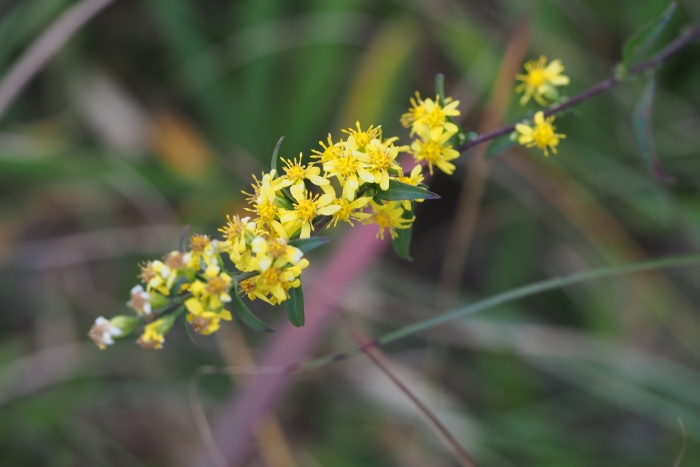European Goldenrod
(Solidago virgaurea)
European Goldenrod (Solidago virgaurea)
/
/

harum.koh
CC BY-SA 4.0
Image By:
harum.koh
Recorded By:
Copyright:
CC BY-SA 4.0
Copyright Notice:
Photo by: harum.koh | License Type: CC BY-SA 4.0 | License URL: http://creativecommons.org/licenses/by-sa/4.0/ | Rights Holder: harum.koh | Publisher: iNaturalist | Date Created: 2015-10-31T14:34:25-07:00 |
























Estimated Native Range
Summary
Solidago virgaurea, commonly known as European goldenrod or woundwort, is a perennial herb native to a variety of habitats including meadows, grasslands, forest clearings, and along stream banks across Europe, North Africa, and temperate Asia. It typically grows up to 39 inches tall and features a woody rhizome. The plant produces numerous small, bright yellow flower heads clustered in erect, narrow panicles from late summer to early autumn. The flowers are highly attractive to pollinators such as bees and butterflies. European goldenrod has lanceolate leaves that are dark green and can be toothed or smooth-edged.
This species is valued for its ornamental qualities, particularly its showy yellow flowers that add late-season color to gardens. It is often used in perennial borders, wildflower gardens, and as part of naturalistic plantings. European goldenrod prefers full sun to partial shade and thrives in well-drained soils, though it is quite adaptable to different soil types. It is generally low maintenance but can spread vigorously, sometimes aggressively, through its rhizomes. In terms of medicinal uses, the plant has a long history of use in traditional medicine for its diuretic, anti-inflammatory, antioxidant, analgesic, and antibacterial properties. However, gardeners should be cautious as Solidago virgaurea is potentially invasive in some regions outside its native range and can outcompete native vegetation.CC BY-SA 4.0
This species is valued for its ornamental qualities, particularly its showy yellow flowers that add late-season color to gardens. It is often used in perennial borders, wildflower gardens, and as part of naturalistic plantings. European goldenrod prefers full sun to partial shade and thrives in well-drained soils, though it is quite adaptable to different soil types. It is generally low maintenance but can spread vigorously, sometimes aggressively, through its rhizomes. In terms of medicinal uses, the plant has a long history of use in traditional medicine for its diuretic, anti-inflammatory, antioxidant, analgesic, and antibacterial properties. However, gardeners should be cautious as Solidago virgaurea is potentially invasive in some regions outside its native range and can outcompete native vegetation.CC BY-SA 4.0
Plant Description
- Plant Type: Herb
- Height: 1-3 feet
- Width: 1.5-2 feet
- Growth Rate: Moderate
- Flower Color: Yellow
- Flowering Season: Fall
- Leaf Retention: Deciduous
Growth Requirements
- Sun: Full Sun
- Water: Medium
- Drainage: Medium
Common Uses
Bee Garden, Border Plant, Butterfly Garden, Low Maintenance, Street Planting
Natural Habitat
Meadows, grasslands, forest clearings, and stream banks
Other Names
Common Names: Aaron’s Rod, Goldenrod, Woundwort
Scientific Names: , Solidago virgaurea, Solidago humilis, Solidago patulifolia, Solidago virgaurea subsp. vulgaris,
GBIF Accepted Name: